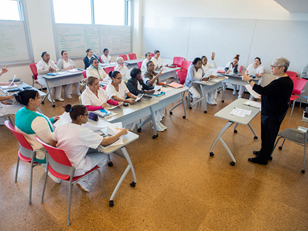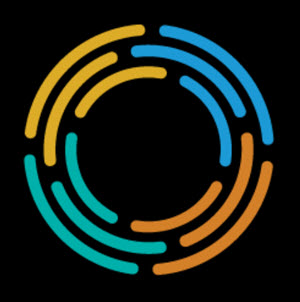PHI develops interactive curricula and training programs designed for adult learners that help direct care workers build the knowledge, skills, and confidence to deliver quality care. We work with employers to create entry-level training opportunities with a direct pathway to employment, and we provide high-quality specialty and in-service training to hone the skills of currently employed aides. Our training also supports advanced roles for direct care workers and promotes continuous learning.
Our training approach responds to a widespread problem—inadequate training and weak training requirements leave many workers feeling unprepared to provide supportive, compassionate care for people facing complex physical and cognitive challenges. As a result, workers often leave direct care work within their first few months of employment.
Entry-Level Training
PHI’s founding affiliate home care agency, Cooperative Home Care Associates (CHCA), has operated a field-leading entry-level training program in the Bronx since 1985. The program is built around PHI’s signature adult learner-centered curriculum, which provides the required hours of training for home health aide (HHA) and personal care aide (PCA) certifications to ensure that trainees learn the many clinical and interpersonal skills required for success in home care.
For more than 25 years, we have worked with CHCA to continuously refine the curriculum’s training content and methodology. From this experience, PHI brings best practices in curriculum development and customization to clients across the U.S.
Advanced Training
PHI develops training and program interventions that elevate the role of the direct care worker, empowering and equipping them to take on new responsibilities. These interventions serve the dual purpose of increasing job satisfaction and enhancing the quality of care for their clients. These positions help employers reduce aide turnover, support case coordination, strengthen entry-level workforce and in-service training, support administrative functions, and enhance consumer services.
Training Delivery & Ongoing Support
In contrast to the traditional teacher-centered process, PHI’s training curricula are grounded in an adult learner-centered training (ALCT) approach, which places the learner’s needs at the center of the process. Our trainers function as learning facilitators, who use an array of activities and techniques to build on what learners already know to support and guide the learning process.
We have produced comprehensive materials to support instructors in delivering PHI training. Our staff travel across the country to provide educator orientations and train-the-trainer seminars to introduce instructors to ALCT principles and teaching methodologies for PHI-designed material. Furthermore, PHI supports ongoing competency development, offering support and coaching to educators throughout program design, launch, and implementation.
Specialty Training & E-Learning
PHI’s specialty training curricula emerged from our relationships with providers. With clients presenting increasingly acute and complex health conditions, employers expressed the need for direct care workers with deeper, condition-specific competencies to provide quality care.
PHI is developing a suite of e-learning specialty curricula for direct care workers that targets the conditions most responsible for hospital readmissions and ER use among long-term care clients: diabetes, hypertension, Alzheimer’s and other types of dementia, congestive heart failure, asthma, and chronic obstructive pulmonary disease (COPD). PHI has created a strong diabetes specialty training prototype for this suite that combines instructor-led content with dynamic multimedia elements that help to efficiently and effectively convey complex subject matter.
This e-learning training model reduces the length of training time needed to convey complex health information, while leveraging employers’ existing training infrastructure. Ultimately, it provides a cost-effective solution to improve care for clients with complex conditions.









